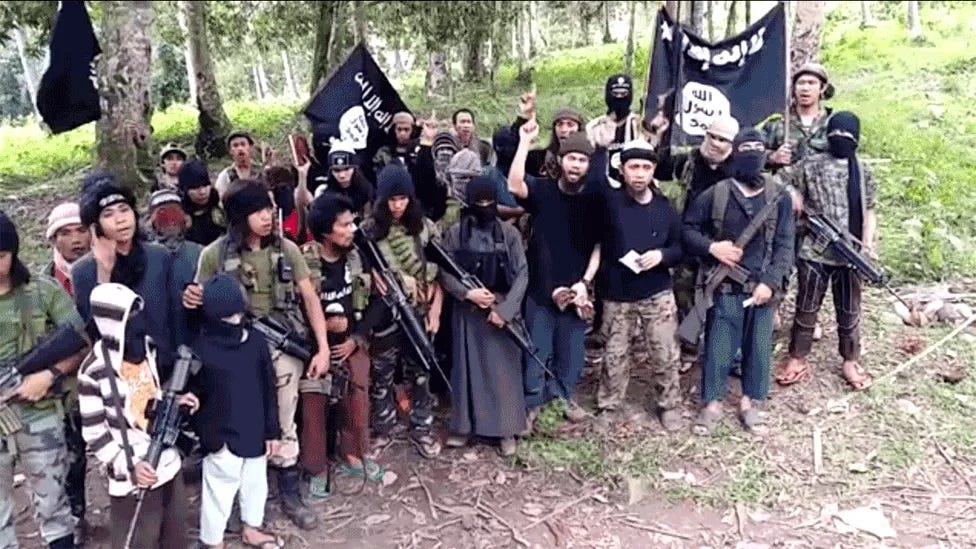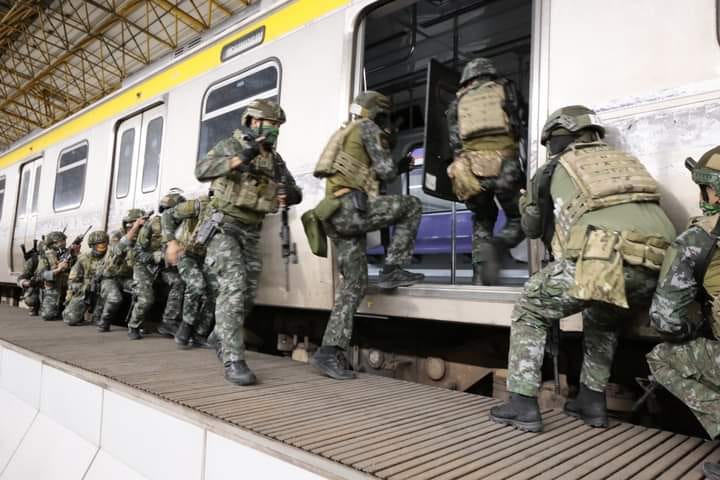'US helped Philippines in March ops against 3 Sayyaf terrorists tagged in 2009 cop killing'
America also helped with bomb disposal and investigations in Thailand and the Philippines in 2022.

KUALA LUMPUR: The United States helped Philippine authorities in a recent arrest operation this year against three Abu Sayyaf terrorists who allegedly killed the Sulu provincial police director in a 2009 ambush, a US official has revealed.
A US State Department official in an online media briefing Thursday (Apr 27) in conjunction with the 40th anniversary of the agency's Antiterrorism Assistance (ATA) programme said ATA has been assisting the Philippines in terrorist arrests for several years.
“...the ATA programme in the Philippines has been conducting proactive arrests against suspected terrorists for several years now, with one taking place recently against three suspected terrorists who were allegedly responsible in the killing ambush of the former Sulu police provincial director,” Gregory LoGerfo, the Deputy Coordinator for Regional and Multilateral Affairs in the Counterterrorism Bureau of the State Department, told the media briefing in response to Akhbar Al Aan’s questions.
“These raids are the result of information-sharing efforts to enable better communication between police and investigators to take down a network before an attack.”
Combined Philippine military and police troops on Feb 5 served arrest warrants against Juko Dahim, Ammas Hatib Ajon and Rogir Mukattir, suspects in the fatal ambush of the then-Sulu police director, Senior Supt. Jularisim Kasim, on May 7, 2009.
The government troops were fired upon and a firefight ensued, resulting in seven Abu Sayyaf members killed including Dahim.
Mukattir, also known as Rojimar Dahim, and another suspected bandit were arrested, but the troops failed to find Ajon, who escaped during the gunfight.
Explaining further on the help to the Philippines, LoGerfo said the Counterterrorism Bureau also supported the creation of the Philippine Anti-Terrorism Act of 2020 and now continues to build the capacity of judges, prosecutors, investigators and police in implementation.
“And our Counterterrorism Bureau will continue to work with key partners in Southeast Asia to improve border security screening, information-sharing, and watch-listing to better detect, deter, and prevent terrorist activity and transit.”
US$105mil assistance
The US official also said Southeast Asian terror groups have been enduring terrorism partners to al-Qaida and ISIS-affiliated groups, but attacks in Indonesia and the Philippines have declined as a result of improved domestic law enforcement, largely supported by ATA, that kept pressure on terrorists.
“And since 2018, our Counterterrorism Bureau has invested more than $105 million in this region, and we will continue to focus on building partner capacity in Indonesia, Malaysia, the Philippines, and Thailand to address the most pressing terrorist threats, with ATA leading the way on implementation.”
Further responding to Akhbar Al Aan’s questions on ATA’s assistance so far in the Southeast Asia region, LoGerfo said the programme had provided support to nations through the Interpol.

“And as a result of that, Indonesia’s 34 largest ports of entry are now actively screening against Interpol databases, accounting for approximately 99 percent of all passenger traffic in the country,” said LoGerfo about databases on transborder criminals including terrorists.
On ATA’s future plans for activities in the Southeast Asia region, LoGerfo promised to give specific details later, but pledged that the State Department are always working closely with partners in the region to develop and improve civilian security partnerships.
Bomb disposal help in Philippines, Thailand
An ATA factsheet emailed to the media after the briefing recounted specific assistance given to enhance the Philippines and Thailand’s explosive ordnance disposal (EOD) capabilities.
“In the Philippines, several bus bombings in the southern Mindanao region in 2022 were successfully responded to and investigated by the Philippine National Police, numerous live devices were rendered safe and evidence was collected to accurately identify terrorist suspects. Philippine EOD teams also helped to secure sites of the November 2022 visit by Vice President Kamala Harris,” the factsheet stated.
“In Thailand, EOD units responded to several deadly bombings to render the sites safe. Highlighting the danger of such operations, an EOD team in April 2022 responded to a blast in the southern province of Pattani that killed a local fisherman. EOD technicians discovered a second explosive device and began to take action when it was remotely triggered, seriously wounding one of the EOD officers. Through the ATA program, the United States grants specialized EOD robots to help lessen the risk for officers responding to sites of bombings,” added the factsheet.
What in the next 40 years?
Another State Department official during the online media briefing spelt out ATA’s plans for the next 40 years that included the cyber realm.
“I can see, for example, expansion to countries that determine that they have a requirement to build capacity, and I see that expansion being made available across the world. I see developing capacity in areas that are perhaps to this point – have proven to be a bit more challenging,” said Julie Cabus, the Deputy Assistant Secretary and Assistant Director for Training in the Diplomatic Security Service.
“So we’re talking about the cyber realm, we’re talking about as countries evolve into a far greater reliance upon cyber, figuring out that problem set and working very closely with our partner nations to do that. The next 40 years provides us an opportunity to continue to evolve with our partner nations.
“Terrorism is not a stagnant problem set. Terrorists are leveraging everything that they possibly can around the world to promulgate their ideology. And therefore we in the next 40 years need to remain nimble, collaborative, cooperative, and also really just be available to identify and work with host nations the needs that exist and be able to provide support to address those needs.”
Touching on countetterroism training delivery, Cabus said they were fortunate that the training cadre that they utilised around the world was probably some of the most experienced in the tactical level of countering terrorism.
“We have folks who have many, many years of experience in this field who are tapped for their expertise to address the specific needs of the host nations in which they are working very closely with. Remember that the training that we offer is not a one-and-done, but there is a commitment to build capacity over a period of time,” she explained.
“And so the training staff that we use to do this oftentimes are very familiar with the regions in which they’re working in, having perhaps previously worked there, gained an awful lot of experience in prior careers and thus they’re utilising all of the lessons they have learned and are translating that into the capacity-building for the host nation.”



